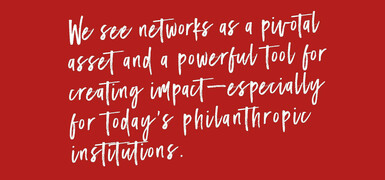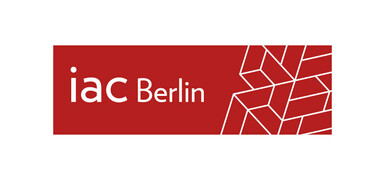
History - five years iac Berlin
The iac Berlin was founded by the Robert Bosch Stiftung in 2017 with a unique double-mission: to establish a state-of-the-art alumni network of its grantees and to support the development of networks for social impact. Five years later, the iac Berlin and the Bosch Alumni Network are well recognized in the philanthropic field and have established numerous initiatives and activities. How did we start, where do we stand, and where are we heading?
For many years, foundations have built capacity, advocated for causes, facilitated connections, and offered a wide range of support. Yet few have found ways to empower individuals or organizations beyond the direct, time-bound support of their established programs. Spurred on by this observation, the Robert Bosch Stiftung – one of the major foundations in Europe – founded the International Alumni Center (iac Berlin) in 2017, which took up residence in a former industrial building in Berlin Mitte.
iac Berlin’s mission is to be a center of expertise for impact-oriented networks that contributes to the global development of its field. iac Berlin gathers knowledge and tests methodologies, sharing their outcomes with the Robert Bosch Stiftung and other foundations. iac Berlin also uses this knowledge in the second branch of its mission, where it has been instrumental in the establishment, curation, and further development of the Bosch Alumni Network. The network brings together former and current fellows, grantees, and employees of the Robert Bosch Stiftung and its partners.

From the beginning, we strongly believed that networks can be a key asset and powerful tool for creating impact that is both effective and sustainable in the long term. The promise of networks lies in their:
- Participation and integration
- Innovation and resilience
- Adaptability and openness
- Efficiency
This belief defines the activities of iac Berlin as well as the Bosch Alumni Network.
We work together with other organizations on equal footing – no one in the lead, no one following behind – to co-develop solutions for positive social change.
From the moment it was founded, our approach to the Bosch Alumni Network was contrary to the usual model of connecting grant-giver and grantee with the foundation as central steering entity that is predominant among foundations and universities – called the “hub & spoke” model in network theory – envisioning instead a multi-community network (click here for an example of this approach). Since 2017, we have therefore strived to develop the Bosch Alumni Network in a way that allows for decentralized connections between its members and which values alumni as partners.
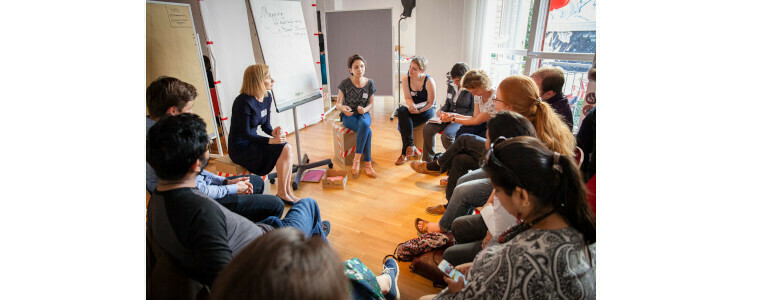
Developing the Bosch Alumni Network
We started with many ideas and a stack of lists with programs, contacts, and a plethora of additional pieces of information from over 50 years of philanthropy at the Robert Bosch Stiftung. As a first step, establishing the digital platform www.boschalumni.net quickly became the linchpin of this endeavor, although convincing people to actually use the platform was no easy task. We realized that personal connections needed to be established or reactivated. We needed to build trust in this new system. We needed shared experiences to create the emotional bonds that a network needs to feel like a home. The value of this approach was reflected in all kinds of personal gatherings all over the globe: from informal one-on-one exchanges in local cafés to huge meetings with dozens of participants in Kigali, Bologna, Paris, New York, and Berlin.
With a growing number of members and activities, the platform became a lively go-to meeting place as well as a living archive of the fellows and programs generated through the foundation’s philanthropic work over the course of decades.
With ever growing momentum, members not only benefited from the network, but co-developed it as well. Within a few years, further decentralization and the self-reinforcing effects of member activities empowered the Bosch Alumni Network to facilitate unexpected connections, new sustainable activities, and innovative approaches.
Quickly, the network achieved much more than originally expected. The number of members steadily increased to 8,000, members assumed more responsibility and active roles as part of ongoing decentralization, and the network’s outer edges became more permeable, which enabled it to build bridges with other networks.
Connecting Networks: Building networks in the field of philanthropy
Around the same time that the Bosch Alumni Network was founded, iac Berlin also created Connecting Networks. This program brings together around 50 foundations and non-profit organizations that are working to strengthen and further develop their approaches to building networks. It offers network-builders a learning environment that functions on many different levels, offering regular training opportunities and peer exchange on topics such as shaping strategy, developing personal skills, solidifying organizational commitment, and building a community of peers.
The development of this network of networks was propelled by a kick-off workshop in 2017 and a strategy retreat in 2018. Together with its diverse community, Connecting Networks co-organizes up to two Learning Labs per year. After exploring the topic of “Impact of Networks” in 2020, a Learning Lab on “Impact Alliances” was held in Vienna, Austria, in 2021, convening over 25 members. Together, participants explored the theory behind Impact Alliances before delving into practical case studies of Impact Alliances in action. Participants were joined by Tim Draimin of Community Foundations of Canada, who provided the theoretical background as well as concepts to help bring innovation and systems thinking into the core of foundations. (Find here an interview with Tim Draimin on Impact Alliances as next evolution for philanthropy.)
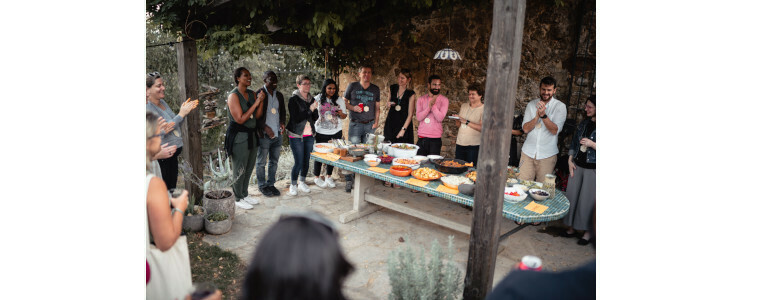
The many roles of iac Berlin
For iac Berlin, working with partners does not stop at developing and discussing ideas. Rather, we work together to put them into action and create concrete initiatives as well. In this context, the iac Berlin assumes a variety of roles, ranging from host to incubator to adviser.
One of the earliest such activities was the Global Diplomacy Lab (GDL). Founded in 2014, the GDL aims to advance inclusive and agile formats of diplomacy and international cooperation to deal with cross-border and global challenges. It is an initiative of the Federal Foreign Office in partnership with the BMW Foundation Herbert Quandt, the Robert Bosch Stiftung, the German-American Fulbright Commission, and the Slovenian Ministry of Foreign Affairs, with the iac Berlin holding the role of implementing organization since 2018. Since that time, the GDL has established a global ecosystem characterized by mutual accountability, respect, and inclusiveness, and has delivered positive transformational change. To maintain its effectiveness, the GDL has developed a new strategy titled, “GDL 2025: Diplomacy 4.0,” which embraces a wide variety of ideas that represent the diversity of GDL members and partners. Find out more about this process here.
In 2021, iac Berlin assumed the role of incubator for the first two years of ANSTOSS DEMOKRATIE. This “strategic experiment” was initiated to develop and test new ways to effectively collaborate on a systemic level. The initiative brought together the ERSTE Foundation, European Forum Alpbach Foundation, Robert Bosch Stiftung, Stiftung Mercator Germany, and Stiftung Mercator Switzerland. With the shared goal of strengthening democratic culture in Austria, Germany, and Switzerland, it tears down silos to bring together partners from politics, civil society, media, the private sector, and science. Find out here how the organizations involved in this experiment perceived their participation, what they learned, and what challenges they had to face.
The SDG Places initiative was also founded in 2021. The initiative works to complete the triangle between foundations, facilitators and inspiring spaces. SDG Places are driven by the conviction that every transformation at a systems level starts with individuals. These individuals need to step out of their everyday routines and comfort zones and open themselves to new perspectives and experiences in order to catalyze change. Therefore, spaces and inputs should appeal to all senses and invite exploration with open minds and open hearts. The BMW Foundation Herbert Quandt gave the first impulse for the initiative and was soon joined by the Robert Bosch Stiftung and the Porticus Foundation as partners, and the iac Berlin as its backbone. Discover more about how SDG Places enable sustainable positive change and can contribute to the future of convening here.
Peer-learning and consultancy
We believe in the positive, long-term effects of bringing together peers for exchange and cooperative learning formats. Similar to the Connecting Networks Learning Labs, we use commensurate approaches with various other partners who are often facing very specific and timely challenges. We balance the practical and cooperative aspects of the challenge with a sound theoretical framework. Pooling our experiences and networks, we learn from each other as well as with each other through consultations, workshops, and facilitated peer exchange, such as case clinics.
Providing targeted support that ranges from network analysis to strategy development, we host virtual, physical, or hybrid workshops and co-learning events. We are uniquely positioned, in that we can not only research promising methodologies to support network building, but can also test them first-hand, e.g. in the Bosch Alumni Network. We then make the knowledge and experience gained from this cycle of theory and practice available to foundations, academia, public institutions, and non-profit organizations that want to build networks with social impact.
As an example of this approach, the Kreisau Foundation did a 2.5-day workshop with us in 2019 that became a cornerstone for their strategic renewal and resulted in the successful reform of their advisory council in 2021. You can read more about this peer-learning workshop here.
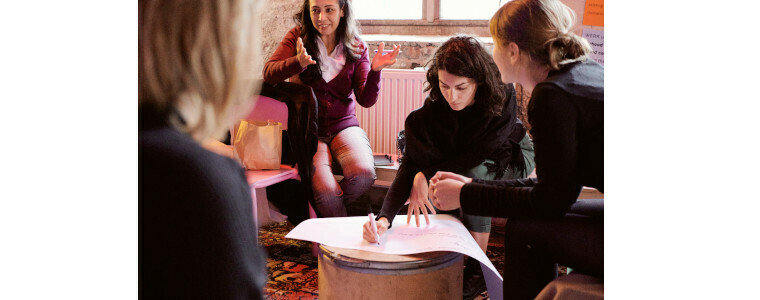
A shift towards deep collaboration
Now, more than ever, we understand the global connectedness of major societal challenges. But any organization trying to solve them alone is bound to fail. Like these global challenges, the solutions must also be interconnected. We want to strengthen this understanding through all of our projects and collaborations.
After an interesting, inspiring, and intense first five years, the iac Berlin is now a well-established Do & Think tank for impact-oriented networks in philanthropy. We cooperate with other organizations on topics such as strengthening democracy, understanding the future of convening, and sustainability for non-profits. Likewise, we work on developing new governance structures, peer-learning situations, and much more.
These activities are either carried out by the iac Berlin itself or as part of joint initiatives like the ones described in these pages. We strongly believe in sharing knowledge and providing open access to our experiences. Therefore, if there is anything you want to know about these or any related topics, please get in touch!



